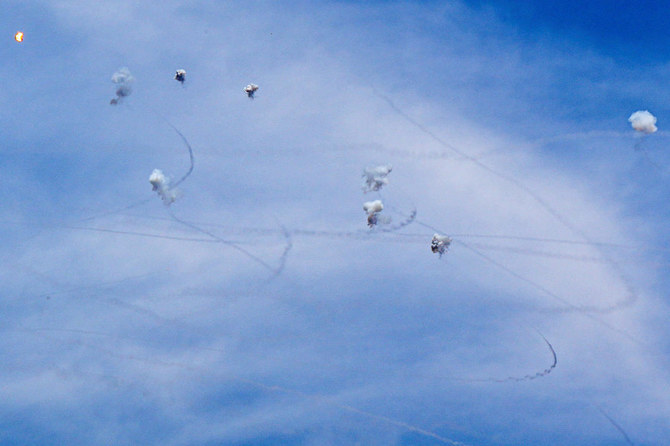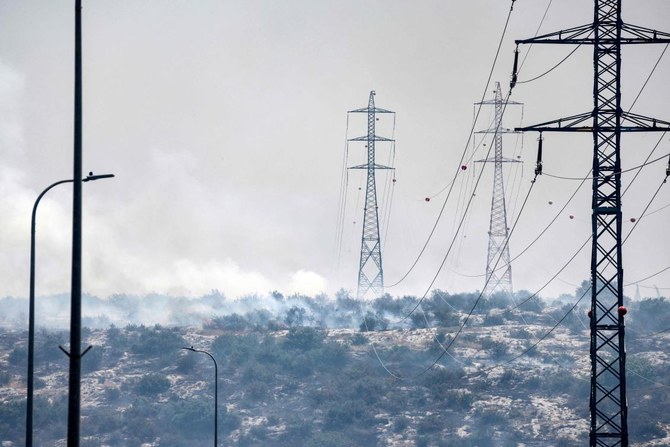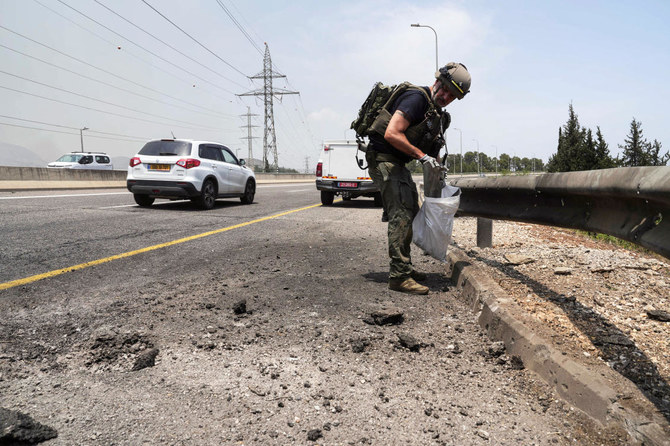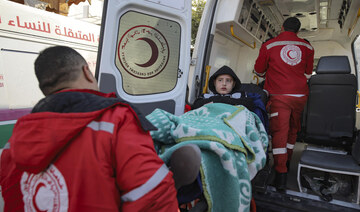SHTULA: A momentary shriek presages a bone-juddering blast, followed by a plume of thick black smoke. Refrigerator-sized holes mark where Hezbollah anti-tank missiles like this one have hit along Israel’s northern border.
Lebanese militant group Hezbollah has been exchanging near-daily cross-border fire with the Israeli army since Hamas’s unprecedented October 7 attack triggered war in Gaza.
The Iran-backed militants have launched thousands of rockets, mortar rounds, anti-tank missiles and attack drones at northern Israel.
The exchanges of fire have killed at least 11 civilians and 14 soldiers in Israel, according to the army.
At least 429 people have been killed in Lebanon, mostly militants but also including at least 82 civilians, according to an AFP tally.
The barrages have dealt a heavy blow to Israeli towns and villages near the border which have been evacuated for more than six months. They have also served as a warning of the far greater destruction that would be wrought by a full-blown war.
The Israeli defense ministry body responsible for rebuilding northern communities said it had received 930 reports of damage — around a third of them categorized as moderate to critical — the vast majority of it inflicted on residential buildings.
Hundreds more cases remain unassessed in towns like Arab Al-Aramsheh, Menara and Metula because it is considered too hazardous for inspectors to enter.
The report did not cite an estimated cost, but a senior defense official who spoke to AFP on condition of anonymity said reconstruction in the hardest hit locations could take months to a year.
In Kibbutz Menara, around 30 percent of buildings have suffered substantial damage, the official said.
At least 26 percent of the reported damage was caused by Israeli troops who have entrenched themselves in evacuated towns and villages along the 120-kilometer (75-mile) border, according to the Northern Horizon Directorate report.
The Israeli military said it “regrets any damage to the residents’ property” and is working to minimize damage as much as possible.
The most vulnerable communities were evacuated immediately after the outbreak of hostilities, displacing some 60,000 civilians. Access to them is restricted by the Israeli military.
But AFP reporters managed to visit Shtula, a village of 300 people sitting on the border that has 44 recorded cases of moderate to critical damage.
Although her neighbor’s house suffered a direct hit, and missiles pounded several other nearby buildings facing Lebanon, Ora Hatan, 60, is one of the few residents who has stayed on.
“An anti-tank missile flew over the chicken coop and right into the house,” said Hatan, pointing at a neighbor’s property.
“A direct hit. Fortunately, no one was home.”
Even after more than seven months of intense bombardment, Hatan won’t leave.
“It’s my house. It’s my land. It’s my country. Where would I go? Why should I go?” she told AFP on her balcony overlooking the Lebanese village of Raymeh two kilometers (little more than a mile) away.
As the war grinds on, and Hezbollah attacks show no sign of relenting, northern residents have grown weary of what many see as talk and little action.
For months, Defense Minister Yoav Gallant has said Israel will restore security — diplomatically or militarily. The two sides fought a devastating war in 2006.
Israel’s Channel 13 reported that National Security Adviser Tzachi Hanegbi told lawmakers Wednesday that “the cabinet hasn’t defined any clear objective concerning the north — not dates, not targets, not strategic aims.”
A poll published Thursday by Israel’s public broadcaster showed that 46 percent of respondents backed military action in Lebanon, while 29 percent opposed.
On Thursday, a few hundred activists set up a protest camp to demand urgent action to restore security and allow displaced residents to return to their homes in the north.
One of the organizers, Nisan Zeevi, lives in kibbutz Kfar Giladi and serves on its emergency response team.
Across the valley from his home, a fortified tower seven storys high looms over the kibbutzim in the valley below that have been frequent targets of drone and missile strikes.
A house in the neighboring kibbutz bears a gaping hole where a missile strike killed a woman and her son in January.
Zeevi said the camp aimed “to express our protest to the Israeli government and to the world until they find a solution to the severe security situation.”
Hezbollah barrages deal heavy damage in northern Israel
https://arab.news/zce69
Hezbollah barrages deal heavy damage in northern Israel

- The barrages have dealt a heavy blow to Israeli towns and villages near the border which have been evacuated for more than six months
- The Israeli defense ministry body responsible for rebuilding northern communities said it had received 930 reports of damage
King of Jordan to meet US President Donald Trump in Washington

- King Abdullah will be the first Arab leader to meet with Trump in his second term
LONDON: Jordan’s King Abdullah II will meet with US President Donald Trump in Washington, D.C., the Jordan News Agency, also known as Petra, reported.
King Abdullah will be the first Arab leader to meet with Trump since his inauguration to the Oval Office in January.
Petra announced on Sunday afternoon that the monarch will meet Trump on Feb. 11 after receiving an invitation from the White House.
Israeli Prime Minister Benjamin Netanyahu is set to visit Washington on Tuesday, making him the first foreign leader to meet with Trump since his inauguration.
Analysts say Trump will discuss various issues with the two Middle Eastern leaders, including the terms of a second phase of the ceasefire deal between Israel and Hamas in the Gaza Strip and the flow of humanitarian aid to the Palestinian coastal enclave.
Omani army chief of staff meets French counterpart in Muscat

- Thierry Burkhard also met Omani Deputy Prime Minister for Defense Affairs
LONDON: Vice-Admiral Abdullah Khamis Al-Raisi, the Omani Armed Forces’ chief of staff, received French Chief of Defence General Thierry Burkhard in his office at Al-Murta’a'a Garrison on Sunday.
During the meeting, both sides exchanged views and reviewed various military matters of mutual interest, reported the Oman News Agency.
Burkhard and his delegation were also received by Omani Deputy Prime Minister for Defense Affairs Sayyid Shihab bin Tarik Al-Said.
The meeting was attended by Nabil Hajlaoui, the French ambassador to Muscat, and the French military attache.
Arab League calls scientists to develop AI as technology becomes dominant

- Saudi Arabia is a key player in the Middle East in adopting AI technologies
- Ahmed Aboul Gheit said rapid advancements in AI resemble an 'arms race' between China and the US
LONDON: Ahmed Aboul Gheit, the secretary-general of the Arab League, called on Arab scientists to develop regulations and standards for artificial intelligence during a dialogue meeting on Sunday.
The two-day meeting, “Artificial Intelligence in the Arab World: Innovative Applications and Ethical Challenges,” held at the Arab League headquarters in Cairo, will explore the development of generative AI technologies, including drones and robotics.
Aboul Gheit said that computer scientists must set up standards for AI projects as the technology has become increasingly prevalent in several sectors in the past decade.
During the opening session, he noted that many Arab countries focused on maximizing AI’s benefits.
Saudi Arabia is a key player in the Middle East in adopting AI technologies across various sectors, including industry and energy. In 2019, the Kingdom established a dedicated organization called the Saudi Data and AI Authority to regulate, develop, and implement data and AI strategies.
Aboul Gheit noted the rapid advancements in AI, particularly in large language models and generative intelligence, resemble an “arms race” among major powers, including China and the US.
“Our scientists, politicians, and thinkers must keep pace with everything that is going on with AI in the world. This general-purpose technology will reshape the way we work, interact, and live,” he added.
Israeli military blows up several buildings in West Bank’s Jenin, Palestinian news agency says

- Jenin Government Hospital Director Wisam Baker told the Palestinian state news agency that part of the hospital was damaged in the explosions
- Palestinian state news agency said a 27 year-old man had been killed on Sunday by Israeli forces raiding a refugee camp near Hebron
RAMALLAH/JERUSALEM: The Israeli military blew up several buildings in the occupied West Bank on Sunday in a series of simultaneous explosions that the Palestinian state news agency said had leveled around 20 buildings in the Jenin refugee camp.
Thick clouds were seen rising from the Palestinian city where Israeli forces have been conducting a massive operation for nearly two weeks that the Israeli military says is targeted at local militants, including seizing weapons stockpiles.
Asked about the simultaneous demolition of buildings in Jenin, a spokesperson for the military said “several structures used as terrorist infrastructure” had been dismantled. More details would be released later, the person said.
Jenin Government Hospital Director Wisam Baker told the Palestinian state news agency that part of the hospital was damaged in the explosions but that there had been no casualties.
Jenin is a crowded township built for descendants of Palestinians who were driven out, or fled their homes, in the 1948 war when the state of Israel was established.
The refugee camp there has been a center of militant activity for decades and the target of repeated raids by Israeli security forces. Israeli forces, backed by helicopters and armored bulldozers, began the assault on the city on Jan. 21, two days after Israel reached a ceasefire in Gaza with militant group Hamas.
Hamas on Sunday called for an “escalation in the resistance” against Israel following the demolition of buildings in Jenin.
The Palestinian Authority, a Hamas rival, exercises limited governance over the West Bank where around 3 million Palestinians live and over which Israel maintains overall military control. Israeli forces have engaged in gunbattles with local militants since the operation began.
Defense Minister Israel Katz on Wednesday said security forces would stay until the operation is complete, without saying when that would be.
At least 25 Palestinians have been killed since the Israeli military operation began, including nine members of armed groups, a 73 year-old man and a two-year-old girl, according to Palestinian officials. The Israeli military says it has killed at least 35 militants and detained over 100 wanted individuals.
Dozens of homes and roads have been destroyed by Israeli forces in the latest campaign. The Palestinian state news agency also said that a 27 year-old man had been killed on Sunday by Israeli forces raiding a refugee camp near Hebron.
Criminal probe launched into Israel PM’s wife: state attorney’s office

- In the first case, Netanyahu and his wife are accused of accepting more than $260,000 worth of luxury goods from billionaires in exchange for political favors
JERUSALEM: Israeli police are conducting a criminal investigation into Sara Netanyahu, the wife of Israeli Prime Minister Benjamin Netanyahu, the office of the state attorney said in a letter made public on Sunday.
“A criminal investigation was opened” into suspected criminal offenses, the office said in a letter to an Israeli opposition lawmaker who had accused Sara Netanyahu of tampering in her husband’s corruption trial after the broadcast in December of a television news investigation.
Naama Lazimi, Knesset member for the Democrats, shared the letter on X on Sunday confirming the criminal investigation was launched on December 26, adding that her office had contacted the state attorney following the investigation by Israeli Channel 12’s Uvda news program.
The show alleged that Sara Netanyahu had tried to intimidate a key witness in her husband’s ongoing corruption trial.
She also organized demonstrations to harass the Attorney General, his deputy and other individuals deemed hostile to her husband, according to the program.
The state attorney’s office added the investigation was being “conducted by the Israel Police accompanied by the cyber department of the state attorney’s office.”
In December, Benjamin Netanyahu testified in the corruption trial in which he faces charges of bribery, fraud and breach of public trust in three separate cases, calling the charges against him “ridiculous.”
The trial, which had been delayed many times since it first began in May 2020, is scheduled to last for months, with an appeals process that could further prolong matters.
Netanyahu, who filed multiple requests to delay the proceedings based on the wars in Gaza and Lebanon, has steadfastly denied any wrongdoing.
In the first case, Netanyahu and his wife are accused of accepting more than $260,000 worth of luxury goods such as cigars, jewelry and champagne from billionaires in exchange for political favors.
He is the first sitting premier to face criminal trial in the country.






















